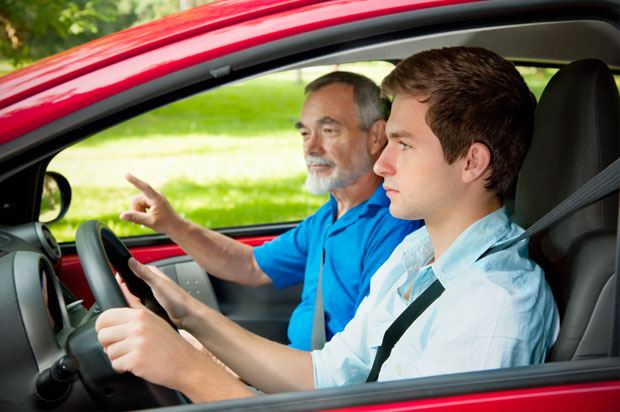Learning to drive

Did you see that stop sign?
Becoming a competent driver can be a long, hard slog, but the results (and the cost) are well worth it. Read our guide to learning to drive in the UK to get yourself on the road to freedom.
Although it’s not compulsory, the Driving Standards Agency (DSA) recommends that you take lessons with an ADI (approved driving instructor). A family member can teach you, but it’s wise to combine this with tuition from an instructor before you book yourself in at a test centre. As well as teaching you the essentials of driving, a qualified instructor will also know might be asked of you in your practical driving test.
What’s the legal age to drive in the UK?
The legal age to drive in the UK is 17 years old. Even though you can apply for your provisional driving licence when you’re 15 years and 9 months old, you won’t be able to legally get behind the wheel until you’re 17. There is an exception to this if you’re claiming Personal Independence Payments (PIP). If you get, or have applied for, the enhanced rate of the mobility component of PIP you can begin driving at 16. There’s more information about PIP in this article.
How do I find an instructor?
Approved driving schools can be found using local directories or the DSA website. Large and well-known schools have instructors across the country and there will certainly be one in your area.
If you’re considering taking Adult driving lessons, it’s crucial to choose a school that provides tailored guidance for mature learners looking to enhance their skills or obtain their license later in life. Coastline Academy stands out in this realm, driven by a mission to eradicate car crashes by fostering safe, confident drivers for life. Employing stringent safety measures, such as independent background and drug screenings for all staff interacting with students, and recording audio and video of each lesson, Coastline ensures a secure and effective learning environment. So, whether you’re a novice driver or looking to brush up on your skills, this Modern Driving School provides a comprehensive and secure environment for learning and mastering the art of driving.
How much do lessons cost?
Many schools offer the first lesson for a reduced rate, however the average cost of lessons after that is between £25–35 per session (usually an hour) for a reliable driving school or independent instructor.
How many hours would I need?<
It depends on how quickly you take to driving. Each learner driver improves at their own pace, so no one can say how many lessons you’ll need. A good driving instructor will monitor your progress at every lesson and should give you honest advice on how ready you are for the practical driving test.
What car choices do I have?
The majority of people learn to drive in a manual car. However, it’s possible to take lessons in an automatic car, which some people find easier to drive. The major difference is a manual car has gears and three foot pedals, including the clutch that is operated with the left foot. An automatic car has an automatic gearbox that changes the gears for you and only two foot pedals that are operated with the right foot. It’s totally up to you what type of car you choose, but you must be aware that if you pass the practical driving test in an automatic car you will not be licensed to drive a manual. If you pass in a manual you can drive both legally.
How to learn to drive quickly
If you want to learn to drive quickly, the first thing you should do is apply for your provisional licence as soon as you are eligible. There’s a DVSA theory test app that you can download to get in as much practise as possible before you sit the test. Learn more about the driving theory test here. When it comes to driving itself, try to get as much time behind the wheel as possible before you sit the exam.
Intensive driving courses are always an option, but they won’t suit everyone. These are for people who want to pass their driving test very quickly – usually within two days (mainly for people who already have some driving experience) to two weeks. Lessons can last between two to five hours a day, but there’s a strong argument that most people won’t learn very well if they’re doing that many hours of driving in a row.
If a parent or somebody else who is over 21 and has been a qualified driver for at least three years can take you out for some extra driving experience in between lessons then that can be a big help, but only book your test when you feel you’re ready. Passing your test isn’t easy, but then again it’s something most people can do once they’ve put the time in.
Learning to drive with a disability
There are medical standards set for all drivers – you must answer questions on the form when you apply for a provisional licence and you may have to undergo a medical examination. You might need to think about whether you need an adapted car and driving lessons from a specially trained instructor. When it comes to the test, if you let the Driving Standards Agency know of any special requirements you have they will try to accommodate them.
Next Steps
- Chat about this subject on our Discussion Boards.
By The Mix Staff
Updated on 08-Mar-2023
No featured article






